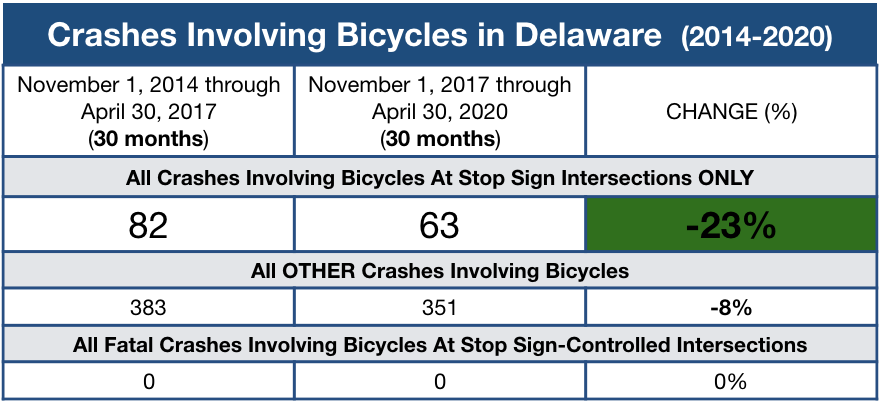In October of 2017, Governor Carney signed the Bicycle Friendly Delaware Act into law. The Act contained a provision (known as the Delaware Yield) making it lawful for people using bicycles to safely yield at stop sign-controlled intersections. The Delaware State Police provided the following data on crashes involving bicycles in the 30 months before the passage of the Act and, for comparison, the 30 months after:

According to the Delaware State Police, crashes involving bicycles specifically at stop sign – controlled intersections fell by 23% in the 30 months after Governor Carney signed the Bicycle Friendly Delaware Act into law (compared to the comparable 30 month preceding period). At the same time, all other crashes involving bicycles in Delaware only fell 8%.
Increased VISIBILITY and Reduced EXPOSURE
For cyclists, the safety value of the Delaware Yield is intuitive. It fits with our everyday riding experience. But for people who experience Delaware streets primarily from behind a vehicle windshield, why a more “permissive” Rule of the Road actually makes our streets safer may be more difficult to understand and appreciate. So here’s what’s happening: There are two general strategies for cyclists to reduce risk at intersections: (1) increase our VISIBILITY to drivers and (2) reduce our EXPOSURE (i.e decrease the amount of time we spend in an intersection). The Delaware Yield maneuver enables cyclists to do both of these things. By permitting cyclists to retain a modest amount of forward momentum, the law makes cyclists easier for drivers to see: Human visual perception has been evolutionarily optimized to be more sensitive to moving than stationary objects and it’s also easier for drivers to see things that are in front of them than to their side. And cyclists also reduce the total amount of time that we are exposed to a possible crash with vehicles, entering and exiting intersections more quickly than we could if we were required to always come to a complete stop.
